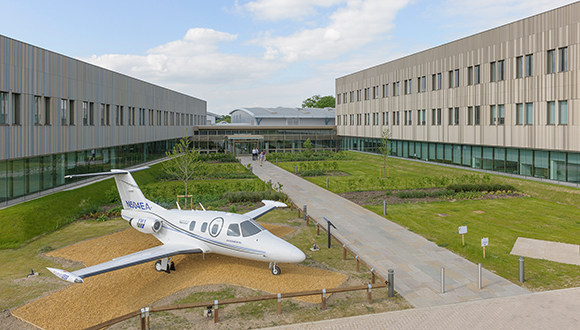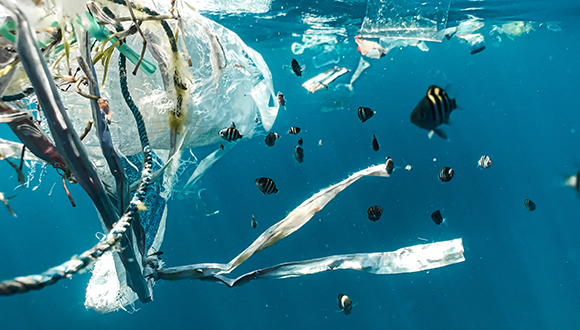Mon, 28 November, 2022
How a Grandmother’s Influence began a PhD Journey
Ana Antelava’s pursuit to have a career in a technical field was inspired by her Grandmother, Emeritus Professor Nelly - first female professor in Pharmacology in Georgia. She used to bring Ana to her academic department and show her exciting science. As a result, Ana grew up with a strong interest in research and technologies.
In 2017, Ana completed her BEng in Chemical and Process Engineering at London South Bank University (LSBU), where she was awarded with the Best Graduating and Final Year Student in the class of Chemical and Process Engineering.
After graduation, she started her professional journey in the engineering field as an Industrial Trainee at Gulf Petrochemical Industries Co., and Process Safety Engineer Challenger at BP. Later that same year, Ana enrolled in the industrial PhD programme at NSIRC. Her studentship was sponsored by Lloyd Register Foundation (LRF).
Speaking about her industry focused academia, Ana said, “An industrial PhD gives you an opportunity to have a practical application of your research, and in my view that makes it more interesting. Being based within industry also provides better visibility of what problems companies face and how engineers can solve them.”
The Research Project
 NSIRC facility at TWI, Granta Park, Cambridge. Photo: TWI Ltd
NSIRC facility at TWI, Granta Park, Cambridge. Photo: TWI Ltd
Establishing the Role of Surface Chemistry and Topography in Determining Wettability and the Development of a Novel Assessment Methodology for Repellent Surfaces.
The research from this PhD has helped industries such as marine, aerospace, and energy, with an assessment of a number of commercially available low-energy coatings and a novel approach to measuring wettability.
It has influenced the classification of surfaces according to their ability to repel various liquids, not only in terms of traditional static contact angles, but additionally, in terms of film-forming behaviour.
Ana conducted a review of surface treatments and their influence on solid-liquid interaction by measuring the static as well as dynamic contact angles with a range of polar and non-polar probe liquids.
During this study, eleven fluorinated and non-fluorinated coating systems were assessed for their ability to promote repellence on smooth surfaces, substrates grit blasted to micro-level roughness/topography, surfaces with nano-scale and dual-scale topography.
To assess the impact of nano-scale and dual-scale roughness on repellence, the functionalised silica nanoparticles were incorporated into the coating system to build up the desired nano-scale topography. This approach was undertaken to help decouple the effects of surface roughness from surface chemistry on wetting/non-wetting behaviour.
The results demonstrated that a high static contact angle with a probe liquid does not guarantee the adhesive behaviour.
Reaching a Wider Audience
Ana has presented her research in several conference including NANOSMAT Conference in Poland, NSIRC Annual Conference’s in Cambridge, UK, Lloyd’s Register Foundation International Conference in London, 2nd International Conference on Nanomaterials Science and Mechanical Engineering in Portugal, and the 5th Smart Materials and Surfaces (SMS) conference, also in Portugal.
Apart from her PhD research, Ana has worked on solutions for better plastic waste management. Her work has now been published in several high-impact research journals – including the Journal of Environmental Management, Environmental Management, Energy and Fuels, Journal of Polymers and the Environment, and Plastics to Energy - a chapter in a book.

The move from being Doctoral Student to a Career in Industry
During her studies, Ana started working part-time as a Project Leader for TWI Ltd and later become a full-time member of staff in the Novel Polymers Technologies section as a result of the dedication and the value she provided to the team.
Ana says that, “The PhD environment at NSIRC gave me industrial training, and that was very helpful in my transition from a PhD student to a Project Leader.”
TWI Technology Fellow Dr Alan Taylor, Ana’s PhD Industrial Supervisor, said, “It is a privilege to guide and mentor researchers at an early stage of their career. Ana’s acceptance of new concepts and ideas allowed the development of a new set of tools that we can apply for the benefit of TWI Industrial Members. I am delighted that Ana is now a Project Leader in TWI and is starting to put these tools into practice”.
The impact of Ana’s research is testament the quality of her work, and the global interest for industry focused academia, and she plans to continue her research in coatings, as well as plastics recycling, developing innovative industrially relevant solutions to the latest engineering challenges.
Learn more about the academic community at NSIRC by following us on social media. You can find us on LinkedIn, Facebook, Twitter and Instagram.